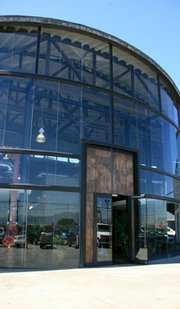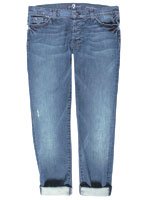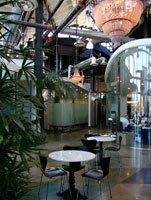Betting That 7 For All Mankind Beats the Odds
Inside the 7 For All Mankind headquarters in Vernon, Calif., the ambience is befitting one of the biggest premium-denim lines in the United States. The former warehouse turned architectural gem has touches of luxury mixed in with recycled materials.
Opulent chandeliers, long and sparkly, dangle from the industrial ceiling, with its exposed metal pipes and aluminum air ducts. Floor-to-ceiling glass walls outlining meeting areas and conference rooms undulate through the structure like soft ocean waves. The polished cement floor, tinted with harlequin-like diamond designs, gleams under the quick footsteps of designers, executives and sales staff. Salvaged wood frames the enormous entranceway.
The newest 7 For All Mankind headquarters, which takes up 225,000 square feet, opened in 2006 when the company was riding high on fashionistas’ radars. At the time, the blue-jeans label was owned by Los Angeles garment manufacturer Peter Koral and investment banking firm Bear Stearns Merchant Banking. A little more than a year later, the premium brand was sold for $775 million to VF Corp., which has the job of keeping the premium-denim label exclusive and trendy.
But that is a tall task these days. All premium brands are struggling to grow as luxury goods tumble in this tough retail climate.
Leading the march to pump up 7 For All Mankind’s sales is Topher Gaylord, the label’s president, who has barely been on board one year. When he arrived in October from Italy, where he was president of VF Corp.’s International Outdoor and Action Sports business, retail sales in the United States hit choppy waters, with consumers spending less on apparel and saving more money.
Complicating Gaylord’s mission was the abrupt resignation on June 29 of Michael Egeck, who oversaw 7 For All Mankind, Lucy Activewear, Splendid, Ella Moss and John Varvatos as president of VF Corp.’s contemporary brand division.
Gaylord was not free to discuss Egeck’s recent departure, which leaves a gap in VF’s executive lineup while a replacement is sought. But Gaylord did acknowledge that ever since he came on board nine months ago, his tenure has been marked by an uphill battle to grow sales. “One week business is up and one week it is very choppy,” said Gaylord, sitting inside his streamlined office, which has a vista of a railroad switching station across the way.
According to financial filings and conference calls with analysts, VF executives have admitted that the blue-jeans label saw a 4 percent dip in revenues during the fourth quarter of 2008 and a 10 percent decline during the first quarter of 2009.
Marathon man
If anyone is poised to push the denim label to higher revenues, it would be Gaylord, who has had a long career working with VF Corp. In some ways, you could describe him as “driven.”
The executive, who grew up in the San Francisco area, is passionate about running ultra-marathons, putting his body and mind through excruciating paces. In 2008, he won the Nemea-Olympia 180-kilometer (108-mile) marathon in Greece, completing it in 17 hours and 35 minutes. In 2003, he came in second in the rugged North Face Ultra-Trail International, a 150-kilometer (93-mile) race around Mont Blanc, Western Europe’s highest mountain. His time was 20 hours and 12 minutes, six minutes behind the winner, a Nepali Sherpa.
“It is a big passion of mine,” explained Gaylord, a wiry figure who recently hiked up Mount Whitney, the tallest peak in California.
“I love the adventure of exploring the unknown and putting one foot in front of the other. It is a pretty straightforward endeavor if you try to go as far as you possibly can, which is what ultra-marathon running is all about. You live a lifetime in a single day.”
Under Gaylord’s leadership, the denim label is trying to raise revenues by giving specialty stores more exclusive designs not found at the major high-end retailers that carry 7, opening more retail stores and adding more licensed accessories.
For Spring ’09, the company introduced its 7*7*7 label, known as Triple 7, a pricey, artisan-style jean that sells only 777 pairs of each style. They retail for $198 to $350. It also has developed the Premiere 7 label, which is sold only to certain specialty stores and not major retailers.
“As the brand has grown bigger, it is important to give our core customers uniqueness,” Gaylord said. “We don’t worry about price in Triple 7. It is really about our designers looking at the most amazing fabrics they can find, being creative with our wash developers and taking embellishment to an entirely new level.” Retail roundup
The bulk of 7 For All Mankind’s customers are the big, exclusive department stores, such as Nordstrom, Neiman Marcus, Saks, Bloomingdale’s and Barneys New York, that have been hard hit by the recession. But the big stores have also helped dilute the label, making it less exclusive than it used to be. Nordstrom is even selling some of its overstock at Nordstrom Rack. Maintaining exclusivity is hard as a label’s exposure and revenues grow.
That is why many designer specialty stores won’t carry 7 For All Mankind.
Madison, the small boutique chain that sells fashion-forward goods at several doors that dot Los Angeles’ exclusive neighborhoods on Melrose Avenue and in Malibu and Pacific Palisades, doesn’t stock the label. “They are a little too basic and conservative for our customer,” said Madison’s head buyer, Belen Hormaeche. “We carry more trend-driven denim lines, our strongest being Current/Elliott and J Brand [both designed and manufactured in Los Angeles].”
Fred Levine, owner of the M.Fredric chain of stores in Southern California, eschews the brand, too. “It is just so accessible at so many department stores and specialty stores,” he said. “We try to carry things somewhat harder to find and special.”
He prefers to run with more niche, trend-driven lines such as Paige Premium Denim, Genetic and Rich & Skinny, a line started by Michael Glasser, one of the original founders of 7 For All Mankind, which was launched in 2000.
But other specialty stores do well with the brand. Blake Nieman-Davis, who has a 6-year-old Portland, Ore., store called Blake, stocks about 55 percent of his merchandise with denim.
At Blake, 7 For All Mankind is one label that performs on a steady basis. “We’ve had the label in here for five years. It always does fine. The thing about 7 for us is we know how to buy it. We buy in a very specific way and are familiar with the fit and washes that work for us,” he said, noting he tends to go with more-traditional styles.
And the 3-year-old Denim Bar in Los Alamitos, Calif., a Los Angeles suburb, is getting its first order of 7 For All Mankind jeans soon. “We tried to carry 7 before, but they required us to carry such a large volume. We’re only a small store,” said store manager Kelleen Rainey. “Before, they required us to carry 10 different styles, and now it’s just four.”
Also on the revenue-boosting front are more 7 For All Mankind stores. Last year, the company had four stores in the United States. That number is now 18, with another nine scheduled to open. Most of those are around 2,000 square feet. Some are stand-alone stores, others are mall-based and a few are outlet stores.
On the international side, the company has 15 stores, the most notable being its Tokyo flagship, which opened in March in a 5,000-square-foot site in the trendy shopping area of Daikanyama.
Many denim brands, such as True Religion and Lucky Brand Jeans, have turned to retail to grow. “It’s a tremendous way for us to build our brand,” Gaylord said.
The stores will help showcase the company’s expanding sportswear categories as well as licensed accessories. A women’s footwear collection launches globally this fall. Schwartz & Benjamin, the New York designer footwear company, has the license to make the array of pumps, heels, flats and sandals bearing the denim label.
For Holiday, 7 For All Mankind will unveil its eyewear collection, which is licensed to Modo of New York. Prime products
While buyers are still being cautious about what they buy, Gaylord plans to keep the product mix fresh, with blue jeans selling primarily under $200.
For Fall and Holiday, the company is betting heavily on the boyfriend jean and the skinny jean. “We have a complete boyfriend series, with three boyfriend styles launched for the second half, which have been well-received,” Gaylord said. “And skinnies are very important for us.”
He said the company has designed a skinny silhouette in a double-knit fabric that fits like a legging but is in the style of a five-pocket jean.
“We’re in the process right now of selling our Fall and Holiday lines. I think buyers are being conservative about how they buy. They are chasing where they can chase,” he noted.
With that in mind, Gaylord plans to back up some of the key boyfriend and skinny jeans to make sure inventory is on hand if buyers find they have a few extra dollars to spend.



























